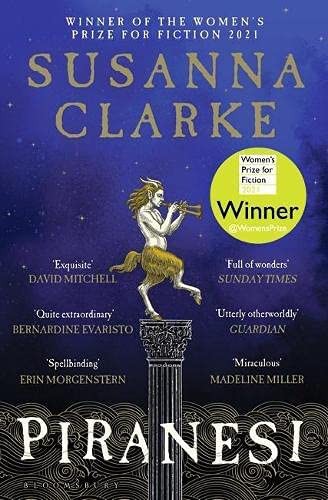[email protected] reviewed Piranesi by Susanna Clarke
my review of Piranesi
5 stars
I like this a lot. I'm not sure why it took me so long to get around to it. it was like a really good, really satisfying meal.

Paperback, 245 pages
Published Sept. 2, 2021 by Bloomsbury Publishing.
I like this a lot. I'm not sure why it took me so long to get around to it. it was like a really good, really satisfying meal.
Unique and richly allegorical. You'll fall in love with the titular character.
Unexpected, mysteryous and very engaging. A fresh fantasy with a touch of philosophy.
Content warning Minor spoiler, which reveals a mid-book event which is very different in setting than the consistency of the opening chapters might suggest.
I really enjoyed this. I was captured by the reliable hook of an initially confounding fantastic or symbolic setting, gradually made comprehensible as information is revealed and the reader acclimatizes to the concepts in play. The infinite architectures of The House reminds me of the similarly spectacular House of Leaves, or the YouTube Backrooms phenomenon. It makes me want to revisit the symbolic locations of Banks "The Bridge". It reminds me of deeply evocative late nights, lost in endless videogame worlds.
About 2/3 of the way through, I caught a reference as a character is using childhood memories as part of a ritual to reopen a doorway to a lost world, from the rose garden of his childhood home. As potential doorways begin appearing, he notes "The color of the roses was supernaturally bright."
This is no doubt a deliberate reference to Aldus Huxley's "Doors of Perception" (bookwyrm.social/book/168195/s/the-doors-of-perception-and-heaven-and-hell-perennial-classics), a trip report on the opening of said doors during the psychedelic experience of mescaline, in which repeated reference is made to a supernaturally bright and vivid vase of flowers, "shining with their own inner light and all but quivering under the pressure of the significance with which they were charged".
It's hard to overstate how much this book feels written specifically for me - I love books with any sort of physically improbable gigantic building, fantasy books where people enter other worlds, academic thrillers, etc - and Piranesi nails the blend perfectly. A sheer delight with an extremely thoughtful denouement.
This is one of those books that's unlike any other. It's surreal and dreamy and the sheer "what the heck's going on?" factor compelled me to read it all in one day.
A novel like this - light on plot, with an extremely limited cast of characters, told in an epistolary style - really sinks or swims on the narrative voice. Luckily the titular Piranesi is fun to read, and comes across as practical and clever, curious and sweet. His ignorance is charming rather than frustrating, and of course his naivete is all part of the mystery.
Highly recommended to anyone who loves an atmospheric and/or experimental story.
I really liked this story! Glad it got put on my radar from Jacob Geller's video on infinity.
Content warning Spoilers at the bottom under a cut
I read this aloud as a bedtime story for a couple of months, and it worked really well. Mostly very short chapters mean plenty of built-in 'another chapter?' breaks; beautiful contemplative descriptions full of wonder, especially in the first half of the book; occasionally gently funny and slow-paced until the last fifth or so. Like Clarke's previous book, Piranesi has a style inspired by historical writing, this time 18th c British diaries, which was a plus for me (I was also reading an actual 18th c diary coincidentally, which was nice. Thomas Hollis' diary is available for free online & his handwriting is very readable...!). It's a lot shorter and less dense than Jonathan Strange & Mr Norrell, quiet, often contemplative, and lovely to read.
Content warnings: Manipulation & gaslighting, violence (not particularly graphic)
Spoilers below: Strong plural vibes in this book, that don't end up (afaik as a non plural person) in any of the bad plural character holes.
I kept expecting the European Enlightenment style of the House and Piranesi's initial narration to be reframed from a beautiful and wise force to something reflecting the evils of actual Enlightenment thought & politics, but it ended up as mostly an aesthetic choice, if I'm not missing something. It's a very well executed book and, for example, the capitalization serves a narrative purpose very well, but I am a little wary or weary of mobilization of the neoclassical aesthetics of the Enlightenment, & Enlightenment-inspired exploration and categorization, to represent wisdom, truth, peace, tolerance etc without any acknowledgement of the slave trade & colonization that many of its thinkers were supported by and ideas were formed in response to. This is a mostly unformed thought and I have not read anything outside the book on its approach.
If we were born in another world what form would the shadows cast upon the walls of our cave take? What mythologies and art would inform our identity? What are the limits that malicious people have to do harm through warping and confining our realities? How does the society around me shape the person I am at any given time?
Piranesi explores these questions in a labyrinth of an endless house full of statues that is flooded by the sea. The answers are in the faces of our neighbors and in the hushing pose of the faun.